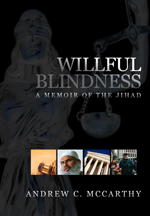|
Reviewed by Joseph Morrison Skelly, Ph.D., Associate Professor of History, College of Mount Saint Vincent, New York, NY; United States Army Reserve “The blind leading the blind.” This phrase could sum up the counterterrorism policies of large swaths of the United States government throughout the late 1980s and the 1990s, including the White House, the State Department, the National Security Council, and even the FBI. With the first bombing of the World Trade Center in February of 1993, however, a core group of courageous men and women in the Department of Justice suddenly found themselves fighting on the forward edge of battle in what we now know as the War on Islamic Terror. Andrew McCarthy was one of these fearless officials. A lawyer in the United States Attorney’s Office for the Southern District of New York, Mr. McCarthy joined his colleagues in tracking down the perpetrators of the attack. Within months he would be tasked to lead the prosecution of their accomplices, who had planned follow-up strikes against New York City landmarks, a scheme that was thwarted with the help of a well placed informant. The ringleader of this band of would-be murderers, the self-styled “battalions of Islam,” was the malevolent Egyptian Omar Abdel Rahman; one of its chief bomb-makers was the notorious terrorist Ramzi Yousef. Mr. McCarthy recounts these episodes, and much more, in his brilliant memoir of the opening skirmishes on American soil of the jihad that has now engulfed much of the globe. There was a problem with the government’s legal paradigm, however, which McCarthy discerned from inside the operating center of the inter-agency Joint Terrorism Task Force (JTTF), misnamed “the war room.” The Department of Justice, as Mr. McCarthy puts it, “was not merely the point of America’s counterterrorist spear. It was the spear. Period. The enemy was at war. Jihadists had made that exquisitely clear, in word as well as deed. Our response was to call in not the Marines, but the prosecutors. And here in the war room, by the battle’s frontline, I would be the field commander. My chief qualification? Why, I was a lawyer, of course.” In other words, while our enemies were already on a war footing – made evident by their attacks against the World Trade Center in New York and, later, the Khobar Towers in Saudi Arabia, the American Embassies in Kenya and Tanzania, and the USS Cole in Yemen – we were responding to terrorism as if it was a criminal justice issue. This was insufficient firepower, as time would tell, to neutralize the threats confronting the United States, even if reinforced by the heroic efforts of Andrew McCarthy and his colleagues in the federal prosecutor’s office. This is what the author means by the title of his memoir, Willful Blindness. In assessing the vision of American society at the time, he says, “The war was on, but we didn’t see it yet. It was still dawn and we were playing catch-up. That we couldn’t see was a problem easily rectified by information. That we wouldn’t see even upon informing ourselves – that was a problem within us. One that hasn’t changed. The enemy’s declaration of war would be complemented by a campaign of murder and mayhem, culminating in the same place, eight years later, when this first strike would be dwarfed. In the interim, the United States would respond with law. And so, while the enemy prosecuted the war, we prosecuted the enemy – er, the defendants.” As he observes elsewhere, “we failed precisely because the tools and assumptions of law enforcement are not suitable for religiously motivated war.” This is so for many reasons, which McCarthy delineates throughout his memoir; one of them, “the most obvious point,” is that “criminal prosecution, by itself, is a grossly inadequate response to the military challenge of international terrorism.” Two paradoxes thus emerge from the book’s absorbing narrative. The first relates to the confusion of legal versus military means, that is, a lawyer subjecting the enemy to a trial within the justice system – Mr. McCarthy – understood that this strategy was inadequate and grasped the need for a more robust response, while those elected leaders and high-ranking national security officials who could have mobilized it failed to do so. The second paradox juxtaposes the architect of the initial wave of jihad to crash upon our shores with his intended targets. Omar Abdel Rahman, the blind sheik, lacked eyesight but possessed an apocalyptic vision and a ruthless determination to transform it into reality, while government bureaucrats and the American people could see, but most were blind to the threats arrayed against them. By highlighting these fatal ironies, Mr. McCarthy has performed an invaluable service. It is important to revisit this early episode in the War on Islamic Terror for several reasons, not least of which is to learn from the mistakes of the past. The author identifies three made in the wake of treating the first assault on the World Trade Center as a crime instead of an act of war: “the public was content to let events unfold and information trickle out through the long and winding road of court proceedings;” law enforcement became “a very effective propaganda tool in the hands of policy makers who don’t see the need, or who lack the will, to adopt more controversial, preemptive approaches to national security challenges;” and, “the tunnel-vision self-imposed on our intelligence by reliance on the criminal process” proved to be debilitating. Another flaw that McCarthy highlights is the paralyzing effect of interagency competition, particularly the prickly relationship that existed between the CIA and the FBI. At one point he found himself in the middle of the fray: the government’s “national security mission was being merged, on the fly, with its criminal investigations functions, and it was suddenly my problem that these guys didn’t seem to get along very well.” This bureaucratic thicket was made even thornier, as we now know, by the infamous FISA legislation that restricted information sharing between the two organizations. Mr. McCarthy, however, managed to slash his way through the legal undergrowth while enhancing his own office’s relations with both agencies and securing convictions in the courtroom. The book’s reconstruction of how the case against the members of “the battalion of Islam” was assembled and prosecuted is one of its most compelling themes. It is also, in retrospect, a tragic tale of missed opportunities. Investigators retraced the steps of leading jihadists like Abdullah Azzam, Mahmud Abouhalima, Clement Hampton-El, Nidal Ayyad and Siddiq Ali. Another one of their co-conspirators was Sayyid Nosair, who, in 1990, had committed “one of the most notorious murders in the modern history of New York City,” the killing of Rabbi Meir Kahane. Hoping to put the matter quickly to rest, the New York City Police Department erroneously described him as “a lone, deranged gunman,” but, beneath the radar screen of state and federal authorities, the first World Trade Center bombing was planned, in part, from his “jail cell in New York’s Attica state prison.” The investigating team ruefully learned that Omar Abdel Rahman had received an entry visa into the United States and, later, a green card, despite being “on the State Department’s terrorist watch list for nearly three years.” They zeroed in on Islamist nerve centers in New York and Jersey City, including the al-Farooq Mosque in Brooklyn and its adjacent al-Kifah Refugee Center. They uncovered scores of paramilitary manuals and frequent trips to a firing range in Calverton, Long Island. Mr. McCarthy describes the participants as “a Who’s Who of the budding jihad Army” in America. In time, many of them were found guilty in court – thanks in several cases to McCarthy’s ingenious decision to try them for the Civil War-era crime of seditious conspiracy – and are now languishing in prison, including Omar Abdel Rahman. The author retells all of this, including the subsequent trials, in a bracing literary style; he enlivens his prose with eye-witness accounts; and he substantiates his analysis with extensive legal expertise. He is clear, though, about his main criticism: had the United States government been more aggressive in the late 1980s and early 1990s, it could have easily rolled up this jihadist network before it struck in 1993 – a principle that also applies to the years preceding 9/11. By the same token, the author asks a series of tough questions about our current counterterrorism policies. For instance, he harshly interrogates America’s relationship with Pakistan since 2001, a period during which “Radicals, probably with the help from sympathetic elements in the Pakistani government, murdered Benazir Bhutto in December, 2007 as she campaigned for democratic reform.” He notes that al-Qaeda “has been permitted to reconstitute itself in Pakistan’s lawless Afghan border region, again under the umbrella of the Taliban, which is resurgent there.” “How could such a thing happen?” he rightly enquires, especially considering the fact that Pakistan “is now the world’s fifth largest recipient of U.S. foreign aid.” Why do we not use the leverage inherent in this largesse to insist that the Pakistani government pursue policies consistent with our strategic aims in the region? In the months following September 11th, Mr. McCarthy took part in the investigation of the al-Qaeda atrocities in New York, Washington and Pennsylvania. Since leaving the Department of Justice in 2003, he has waged a one-man counteroffensive against our jihadist enemies as a public intellectual, a contributing editor at National Review Online, and the Director of the Center for Law and Counterterrorism at the Foundation for the Defense of Democracies in Washington, D.C. Alas, some people, including members of Congress, still refuse to heed his wise counsel regarding pressing issues relevant to the War on Islamic Terror, such as the legality of the surveillance of foreign terrorist suspects, the constitutional soundness of military commissions, the necessity to keep open the holding center at Guantanamo Bay, and the imperative to maintain a war footing in our campaign against al-Qaeda. In this light, what if these misguided individuals suffer not just from a lack of vision, but from a lack of will? Such a syndrome can be described as a spiritual malaise at best, a self-destructive moral disease at worst. During the twentieth century, several writers reflected upon this malady, including Oswald Spengler, who published The Decline of the West in the 1920s, and James Burnham, who wrote The Suicide of the West four decades later. Apparently, this sickness of the soul still lingers. While this condition may exist, it need not be fatal. Modern liberal democracies have rallied numerous times in the face of mortal threats, thus revealing their resiliency. But first we must see our enemies clearly. Read Willful Blindness. It will open your eyes. |


 Willful Blindness: A Memoir of the Jihad
Willful Blindness: A Memoir of the Jihad